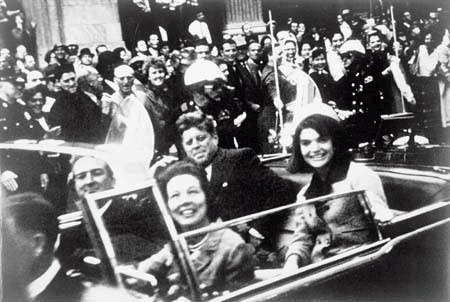Teaching the assassination to Generation Y
An SMU course looks into the presidental assassination in Dallas 50 years ago.

DALLAS (SMU) – How do you teach the turmoil of President John F. Kennedy’s assassination to students with no frame of reference for cold war paranoia, the turbulent 60s and the romanticism of a presidential Camelot?
 Dennis Simon |
 Tom Stone |
SMU political science professor Dennis Simon and senior English lecturer Tom Stone are embracing the challenge as they teach a special course to undergraduates during the fall months leading up to the 50th commemoration of JFK’s assassination in Dallas. With access to SMU’s extensive collections of archival material related to the event, and proximity to the site of the assassination, a group of 40 SMU undergraduates have a unique opportunity to experience the zeitgeist of that turbulent time as the nation reopens a five-decades-old wound.
“So much has changed, and so much hasn’t,” said Stone, who began teaching a similarly themed literature-based course around the time Oliver Stone’s conspiracy-feeding “JFK” motion picture was released in 1991. “Being in Dallas, a mere six miles from the scene of the crime, made it a perfect choice.”
Simon brings to the new course analysis of political thought in the JFK era, as well as the impact of the assassination on the nation’s political trajectory, bolstered by his experiences leading SMU’s annual civil rights pilgrimage through the American south. While JFK was slow to publically support the civil rights movement, he called for the legislation that ultimately became the Civil Rights Act of 1964 on June 11, 1963 – five months before his death in Dallas.
“You have to establish both the political context and the culture at the time, so that’s what we’re working on – the cold war, McCarthyism, and the social conformities that prevailed in the 1950s,” Simon said. “Once they have an appreciation for that, it helps them interpret JFK’s biographies, his campaign for office and his administration.”
 The presidential motorcade in downtown Dallas in 1963. |
People can look at the same context, culture and the record JFK left behind and still arrive at widely different interpretations, Simon said. The SMU students are weighing the notion of Kennedy as a very wealthy and privileged man whose fortune and father were instrumental in advancing him politically – against the image of Kennedy overcoming illness and injury to build his own political organization and move forward.
Both professors and students in the class intend to post analysis and interpretation from their academic journey on the SMU Adventures blog.
Students already have turned in a significant assignment -- oral histories taken from people who experienced the horror and confusion of the assassination. Most students interviewed their grandparents, Simon said, laughing at the realization that he is included in that generation.
“They all could tell you precisely where they were and what they were doing when they heard about the assassination,” Simon said.
Find out more about SMU’s JFK experts and archival resources related to the assassination at www.smu.edu/JFK.
# # #
SMU is a nationally ranked private university in Dallas founded 100 years ago. Today, SMU enrolls nearly 11,000 students who benefit from the academic opportunities and international reach of seven degree-granting schools
20002-nr-09/20/13-kc